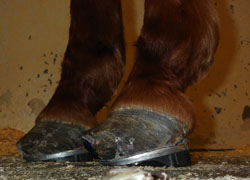Spring pastures put some horses at health risk
Spring horse pastures can cause obesity, diarrhea, colic and laminitis to some susceptible horses.
If horses are kept on pasture year round, they usually adjust to the new foliage as it grows in the early spring. Most management problems occur when horses have been confined, fed a hay/grain ration, and then abruptly turned out to pasture in the spring. The lush spring growth of pasture foliage, either grasses or legumes, is high in moisture content (75-85%) but also relatively higher in protein, vitamins and minerals on a dry matter (DM) basis than during other seasons of the year. The energy and protein content of foliage can be as much as 50% higher in early vegetative growth compared to that in vegetative growth twelve weeks later.
Horses kept in stalls through the winter and abruptly allowed free access to pasture might overeat because of the palatability of the lush green foliage. This over-consumption can put a horse at risk for certain nutrition-related problems.
1. Overweight/obesity - Depending on individual metabolism, some horses can gain significant weight on pasture alone.
2. Diarrhea- Higher moisture content and the change in ration can trigger a “loose stool.” The feces usually become firmer as the horse adapts to the pasture, but in some cases a horse must be confined temporarily and put on a hay-based ration to restore normal bowel function. In a small number of cases, a horse might require medical treatment to clear up the diarrhea.
3. Colic - Although colic is not common in these situations, any change in the ration if done rapidly can cause excessive gas or an intestinal upset in certain horses, leading to colic.
4. Founder (Laminitis) - Risk of this disease is always a concern when the ration is changed abruptly, especially when going from hay-based ration to pasture. Even though as a group, ponies are more susceptible to laminitis from early pasturing, horses are also at risk.

Hooves of a horse with laminitis.
For more information read the following MSUE News articles:
- Horse pasture and fructan concentrations
- Managing horses on spring pastures
- Pastures provide a valuable feed source for horses
Additional Resources Related to the Topic:
My Horse University and eXtension Free Archived Webcasts:
- Equine Metabolic Syndrome
Dr. Raymond Geor, Recorded: October 2010 - Countermeasures for Equine Laminitis: Carbohydrate Profiles in Feeds and Forages
Dr. Bridgett McIntosh, Recorded: April 2009 - Pasture Management for Horse Acreages
Dr. Dave Freeman, Recorded: February 2009
eXtension/horse Learning Lessons:
This article is an excerpt from My Horse University Online Horse Nutrition Course. Other resources offered by My Horse University and eXtension HorseQuest include a free monthly e-newsletter, free monthly webcasts and social networks on Facebook , Twitter, and YouTube.



 Print
Print Email
Email

